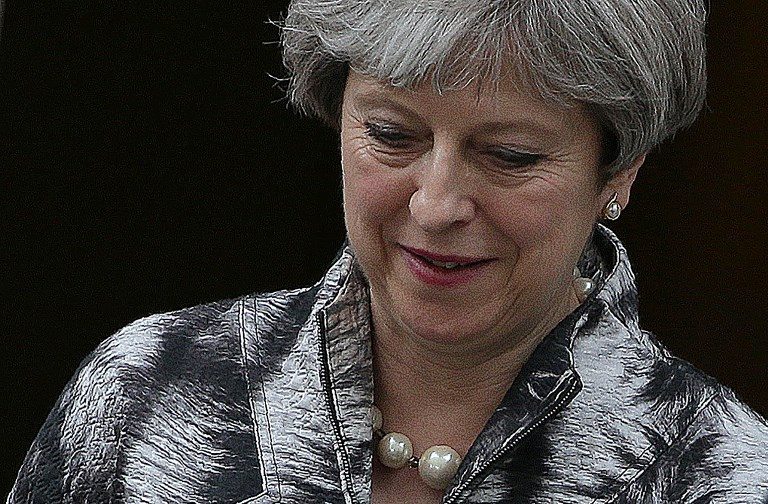SUMMARY
This is AI generated summarization, which may have errors. For context, always refer to the full article.

BRUSSELS, Belgium – British Prime Minister Theresa May made an early-morning dash to Brussels on Friday, December 8, for crucial talks with EU Commission chief Jean-Claude Juncker to seal a deal on Brexit divorce terms.
May is returning just 4 days after her last talks with Juncker were scuppered when her government’s Northern Irish allies objected to plans for the future of the border with EU member Ireland.
Negotiators worked through the night to reach a deal before a deadline on Sunday, December 10, for Britain to finalize its divorce terms from the EU, ahead of a December 14-15 leaders’ summit that will unlock negotiations on a future trade deal.
May’s Downing Street office confirmed that she was coming to Brussels with her Brexit minister David Davis to meet Juncker and chief EU Brexit negotiator Michel Barnier.
The European Commission confirmed the pair were to meet around 0600 GMT at the organization’s headquarters with a press conference shortly afterwards.
Talks went on through the night, with the Commission saying late Thursday, December 7, there had been “progress but not fully there yet”.
European Council President Donald Tusk was also set to make a statement giving a “situational update” on Brexit at 0650 GMT on Friday, before heading to Hungary, adding to the fevered speculation about a deal.
Juncker spoke first with Irish Prime Minister Leo Varadkar then May on Thursday night in a bid to break a deadlock over the wording of a deal on future arrangements for the Irish border.
‘Not there yet’
The EU insists on making sufficient progress on the Irish border, on Britain’s divorce bill, and on the rights of European citizens in Britain before unlocking the second phase of negotiations.
Those would deal with a transition period for around two years after Britain leaves the bloc on March 29, 2019, and a future EU-UK trade deal.
But talks between May and Juncker in Brussels on Monday, December 4, broke up without a deal after the pro-British DUP party in Northern Ireland that props up the British leader’s government objected to a clause in the deal.
The wording had said that British-ruled Northern Ireland would be in “alignment” with EU rules to avoid a hard border with the Republic of Ireland, as Dublin insists.
DUP chief whip Jeffrey Donaldson had said late Thursday that “discussions are ongoing”.
The European Commission had earlier Thursday set a deadline of Sunday for May to reach a deal on divorce terms so they can be approved by member states in time for the summit.
‘Totally and utterly incompetent’
Earlier Thursday, European Commission spokesman Margaritis Schinas dismissed British newspaper reports that the Sunday deadline could be extended into next week as “not correct”.
Scotland’s nationalist leader showed little patience, accusing the British government of being “totally and utterly incompetent” on Brexit.
First Minister Nicola Sturgeon said “the real lesson” of the past week was that Scotland “will always be at the mercy of reckless decisions taken by Tory governments at Westminster” unless it becomes independent.
“The sooner we are in control over our own future here in Scotland the better, and this week has proved it,” she added.
Eurogroup chief Jeroen Dijsselbloem offered some calming words, saying Britain’s City of London financial hub “will not fall apart” after Brexit even if it loses the right to allow banks to trade freely across the bloc.
Dijsselbloem, the Netherlands finance minister who chairs meetings of his counterparts in the 19-country eurozone, said that some businesses would nevertheless have to relocate.
“I don’t believe that the City will fall apart and that everyone will flee. I don’t think that’s how it’s going to work,” he told a European Parliament committee.
His reassurances come at a time when Britain’s finance sector is anxious about losing the “passporting” rights which allow large international banks to trade throughout the EU while being based in Britain. – Rappler.com
Add a comment
How does this make you feel?
There are no comments yet. Add your comment to start the conversation.